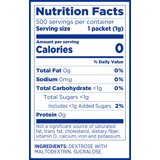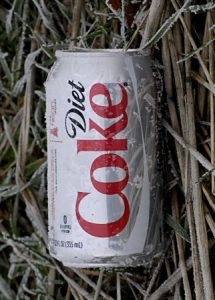
Hi Dr. Hull. I’m Donna from Seymour, IN. I’m a 45 year old female who started experiencing health symptoms after I started consuming aspartame. I found you through a link to a site about phenylalanine.
I have been using various diet supplements and nutrient supplements from MRC (the Metabolic Research Center). I don’t use Equal and my children don’t use the stuff.
I am currently going to the Metabolic Research Center and have lost 6 pounds. However, I figured out that I am having difficulty with their high nutrient supplements that are required to be taken. They seem to make me tired and I have headaches.

I noticed that the supplements contain phenylalanine, and I decided to do some research on it. I am not sure if I am having an allergic reaction to it or not, or if my other meds are not compatible with the supplements.
From Dr. Hull
Thank you for your email. It appears that you are having a reaction to phenylalanine, but did the label say “Caution: Contains phenylalanine?” This means it has aspartame in it.
You are not PKU, but I wonder if you are PKU recessive. PKU stands for phenylketonuria, a rare inherited metabolic disease that prevents your body from metabolizing the amino acid phenylalanine.
Phenylalanine is a building block of protein that comes from foods like meat, eggs, nuts, and milk, and aspartame is 50% phenylalanine. When your body can’t break down phenylalanine, it builds up in the blood and brain, and this can lead to brain damage and other serious health problems if left untreated.
PKU is caused by a change in the phenylalanine hydroxylase (PAH) gene, which helps create the enzyme that breaks down phenylalanine. It can affect people of all ethnicities, but it’s more common in white, American Indian, or Alaska Native people. In the United States, about 1 in 10,000 to 15,000 babies are born with PKU each year.
PKU is usually diagnosed through newborn blood spot screening using the heal-stick test. If diagnosed, a baby will be referred to a specialty clinic for treatment, which typically involves a specialized diet and supplements. It is a lifelong commitment following a diet that requires avoiding all foods with phenylalanine.

This includes the diet sweetener aspartame.
What’s really sad these days is the FDA no longer requires the caution label on all products that contain aspartame. This warning label used to be mandatory for all foods and drugs containing aspartame, but for some reason, it is not followed today.
So, I wonder if these products you are using contain aspartame, and if not, consider that you may have a susceptibility to the isolated amino acid, phenylalanine.
Read all your labels on everything you are putting in your mouth, and avoid ALL aspartame. See if this helps.
And by the way, using the diet sweeteners actually results in weight gain, so consider this, too.
I hope this provides you some answers.
_______________
If you want to learn more about healthy living and disease prevention, contact me at janethull.com. Remember that you are never alone when you are looking for good health!
I look forward to supporting you on your journey to alternative health and wellness.
_____________
Disclaimer: This article is for informational purposes only, and is educational in nature. The FDA may not have evaluated some of the statements. This article is not intended to diagnose, treat, cure, or prevent any disease. Please discuss with your own, qualified health care provider before adding supplements or making any changes to your dietary program.
Before taking vitamins, consult your doctor; pre-existing medical conditions or medications you are taking can affect how your body responds to multivitamins.
You have our permission to reprint this article if you attribute us with a live back-link to this article and the youtube links. http://www.janethull.com/
_______________